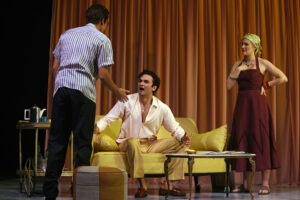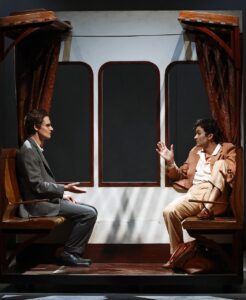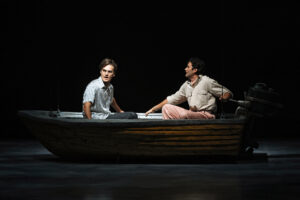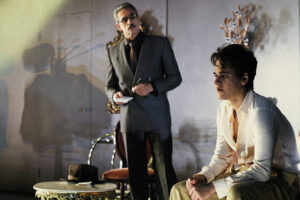Roslyn Packer Theatre, August 23
8/10
Having penned her acclaimed play Switzerland about novelist Patricia Highsmith, Joanna Murray-Smith has now waved her wand across Highsmith’s most famous book, and made it a cracking play. An expert at fizzing dialogue and character exploration, here Murray-Smith has to sustain Highsmith’s premium on plotting, surprise and suspense.

There’s common ground, however, in excavating the psyche of Tom Ripley, who, in Sarah Goodes’ world premiere production, is consummately and energetically played by Will McDonald. It’s a whirlwind role: narrator, minor Manhattan conman, ingratiating sycophant, dreamer, thief, closet homosexual, desperate melancholic and murderer.
McDonald’s Ripley sometimes addresses us as his confidants or as himself in a mirror. He speaks to us slyly, wryly, mendaciously and occasionally wittily, so the effect’s not unlike Richard III confiding in us before his next atrocity. But here no crown is at stake; just a life with a future, via eliminating his newfound friend, the uber-rich Dickie Greenleaf (Raj Labade), and assuming his character (and chequebook).

McDonald excels at each step, firstly being a cunning wastrel approached by Dickie’s father (the ever-reliable Andrew McFarlane) to entice Dickie to return to the family boat-building business from an indefinite Italian holiday. We see him painfully self-conscious in the company of Dickie and his girlfriend Marge (Claude Scott-Mitchell), then the dawning of his scheme, the frightening execution of it, and, triumph of triumphs, his metamorphosis into Dickie.
Goodes has directed the play with singular imagination, especially in the decisions made with set designer Elizabeth Gadsby, so that a 1950s Italian beach scene, for instance, is instantly created with gelato-flavoured beach umbrellas. Crew become extras as required, and trips are depicted by a fragment of train carriage spinning on the spot. Elegant little internal scene-setting tableaux materialise at the extremities of this theatre’s sizable stage, while external scenes are more expansive.

The murder of Dickie in the boat and disposal of his body in the sea are realised with such potent theatrical magic as will haunt your memory for some time.
Labade is an aptly charismatic Dickie. He has a rakishness, hipness and flame-like attraction for the relatively drab, moth-like people who encircle him. Faisal Hamza is a likeable Freddie, in a performance carrying echoes of the loud bonhomie of Philip Seymour Hoffman’s characterisation in Anthony Minghella’s movie, and Johnny Nasser gives a film-noirish portrayal of Inspector Rolverini, tasked with untangling assorted murders and disappearances among these American tourists.

The problem is Marge. Where everyone else is not just credible, but compelling, Scott-Mitchell, with the notable exception of the final scene, creates a much slighter characterisation, not helped by costume designer Emma White (who does a sterling job with the men) oddly saddling Marge with overt bad taste.
But burning through the play is the way Murray-Smith, Goodes and McDonald establish Ripley’s fragile sense of self – “a blank slate of a face”, he calls it – and then transform it.
Until September 28.